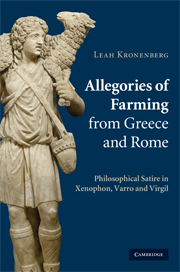Book contents
1 - Socrates and Critobulus (Oec. 1–6)
from PART I - XENOPHON'S OECONOMICUS
Published online by Cambridge University Press: 03 May 2010
Summary
Socrates presents his radical redefinition of farming and estate management in the Oeconomicus' opening dialogue with Critobulus (Oec. 1–6). He does so not by using any radically new words or terms to define it, but by expanding or contracting the meaning of ordinary nouns like “estate” or “property” and evaluative adjectives like “beneficial” or “harmful.” He begins by asking Critobulus what the function of oikonomia is, and Critobulus' naïve answer turns out to be essentially correct: “the [function] of a good household manager is to manage his own household well” (οἰκονόμου ἀγαθοῦ εἶναι εὖ οἰκεῖν τὸν ἑαυτοῦ οἶκον, 1.2). However, Socrates redefines the meaning of each term in Critobulus' answer in typical Socratic fashion so that the oikos (“house”) comes to mean all property that is “beneficial for one's life” (ὠϕέλιμον εἰς τὸν βίον, 6.4) and for something to be beneficial, one has to know how to use it (6.4). Thus, before becoming a good oikonomos (“household manager”), one first must figure out what is truly good and beneficial in life – that is, one must become a Socratic philosopher. In the context of the Oeconomicus, becoming a Socratic philosopher involves figuring out that the virtues of farming and household management, as described from both a conventional Persian and Greek perspective, are derived entirely from the material benefits it provides its practitioners, and that there are more important things in life than material wealth or physical success.
- Type
- Chapter
- Information
- Allegories of Farming from Greece and RomePhilosophical Satire in Xenophon, Varro, and Virgil, pp. 39 - 53Publisher: Cambridge University PressPrint publication year: 2009

